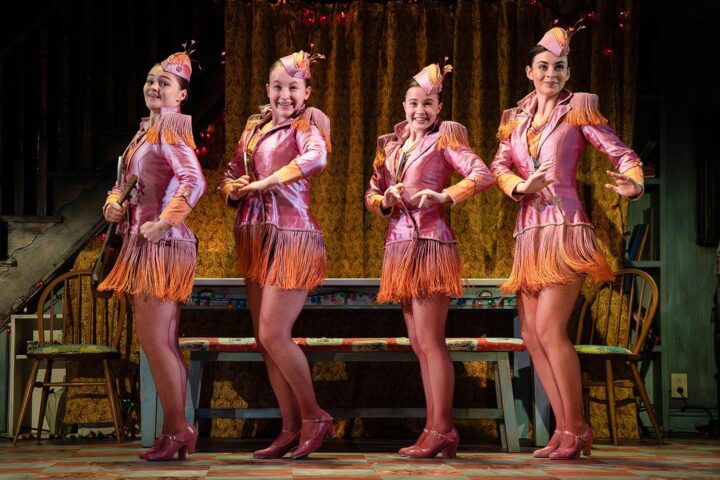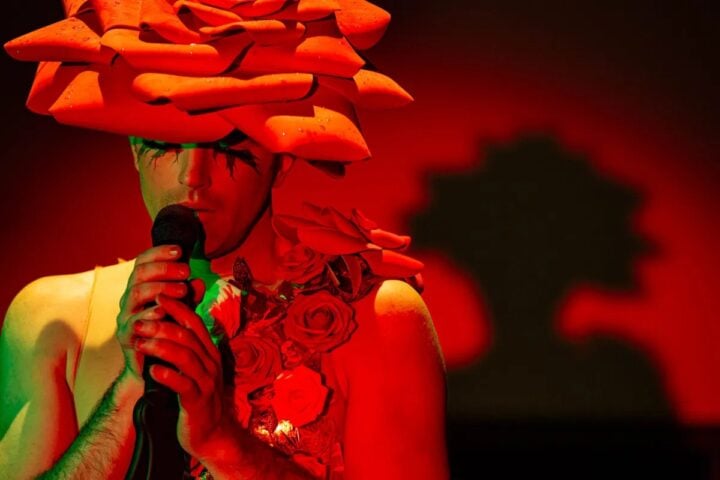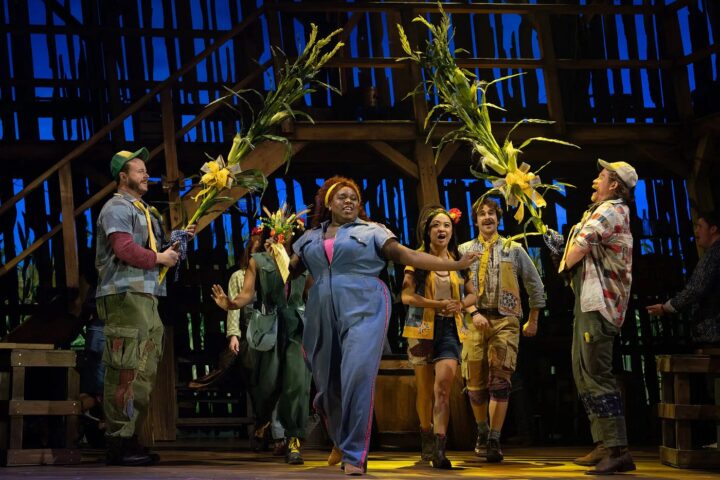At a recent performance of Red Bull’s very funny adaptation of Ben Jonson’s The Alchemist at New World Stages, cast members paused mid-scene to allow an usher to castigate a patron in the second row for lowering his mask. The audience then applauded. There’s a new second level of performance now for frequent New York City theatergoers in 2021: the shared production—starring proof of vaccination and COVID safety officers and sanitizer—that we put on for each other and for the cast of shows, and says that we understand what it takes to ensure that we can all continue to empower liveness.
And if theater having been gone for so long during the pandemic didn’t magically improve mediocre material or increase the chances of seeing something wonderful, perhaps the shows that are most extraordinary do hit differently now: The best theater of 2021 hasn’t just been a treat but a privilege to witness—and one that we shouldn’t again take for granted.
Girl from the North Country, Belasco Theatre
Girl from the North Country, gray and melancholy three years ago at the Public Theater, has harnessed new warmth and poetry on Broadway, where it first opened just days before the shutdown in March 2020. It’s a jukebox musical, yes, but playwright Conor McPherson deploys Bob Dylan’s catalog with riveting originality to illuminate the inner lives of a group of lost souls living in a Depression-era boarding house. Dylan’s poetry and melodies humanize all of the lonely, stuck, repressed characters by endowing them with a means of articulate self-knowledge they couldn’t otherwise conjure. As performed by an extraordinary ensemble of actor-musicians, it’s a moving, fresh step forward for the jukebox genre.
Kimberly Akimbo, Atlantic Theater Company
Bracingly quirky and refreshingly cliché-free, this new musical from David Lindsay-Abaire and Jeanine Tesori centers on Kimberly Levaco, a 16-year-old with a rare, life-limiting genetic disorder that makes her appear to be 60. She’s played by real-life sexaganerian Victoria Clark, shockingly convincing as an adolescent. Kimberly Akimbo nods thoughtfully to its protagonist’s mortality: it’s heartbreaking watching Kim listen to her classmates daydream about their post-high school futures when hers isn’t promised. But the show leans much more into the wackiness surrounding her, especially the machinations of her ex-con aunt (Bonnie Milligan in a gloriously nutty performance) and the tuba-toting, anagram enthusiast boy next door (Justin Cooley, an actual teenager who has disarmingly convincing chemistry with Clark). Kimberly Akimbo gracefully grounds itself in its own absurdity.
Lackawanna Blues, Samuel J. Friedman Theatre
Ruben Santiago-Hudson wrote, directed, and starred in this one-man marvel, a gorgeous Goldilocks of a play that’s neither underbaked nor overstuffed but just right. (“One-man,” though, may be a bit of a misnomer since the production also features the onstage guitarist Junior Mack’s often stirring accompaniment throughout.) Santiago-Hudson’s autobiographical testimony to the woman who raised him, Lackawanna Blues surges with empathetic creativity as he embodies, with only the slightest change in posture or vocal inflection, the many denizens of the boarding-house where he grew up. What most distinguishes Lackawanna Blues is a laser-sharp clarity of purpose: Every characterization serves the mission of enriching the audience’s vision of Nanny’s ferocious warmth and warm ferocity.
Merry Wives, The Public Theater
Jocelyn Bioh’s wickedly smart reinvention of Shakespeare’s The Merry Wives of Windsor, now set in a post-pandemic community of African immigrants in Harlem, welcomed audiences back to Shakespeare in the Park and to live theater. Bioh—also represented this season by her joyously silly comedy Nollywood Dreams at MCC Theater—both pays tribute, and plays fast and loose, with Shakespeare’s verse, but her edits integrate the newly conceived time and place and culture with both fidelity to the text and conviction in making the story work for the community whose voices she seeks to amplify. As Falstaff, Merry Wives also finally foregrounded Jacob Ming-Trent, a sensational Shakespeare stalwart, long overdue for a marquee role, who coaxes clarity of meaning out of early modern verse as if he’s the first to discover it there. In its jubilant purposefulness, the production distills what legacy we need most from Shakespeare right now and what art we need most from each other.
Morning Sun, Manhattan Theatre Club, New York City Center
In Simon Stephens’s new play, which pays gentle homage to Edward Albee’s Three Tall Women, three generations of women gather in a curiously undecorated space to tell the story of Charlie McBride (Edie Falco). And though the broad strokes of her life are rather ordinary, the play’s slowly unfurling loveliness lies in the revelation of its characters’ specificity: As we come to see the world through Charlie’s eyes, it’s her perceptions, her connections to her mother and daughter, her battered dreams that lend her enormity far beyond the staid synopsis of her story. Falco, offering a simple, palpable portrayal of a woman unearthing her own narrative through retelling it, is flanked by the superb Blair Brown and Marin Ireland. With a raw final scene that starkly confronts Charlie’s mortality, Morning Sun illuminates the possibility of discovering hugeness in anyone’s story if you only listen long enough.
Pass Over, August Wilson Theatre
The reopening of theaters meant new beginnings for many, but for playwright Antoinette Chinonye Nwandu, the moment demanded a new ending too. In the wake of George Floyd’s murder, Nwandu reimagined the final minutes of Pass Over, which premiered off-Broadway in 2018, replacing black suffering at the hands of a brutal police officer with a cathartic, if complicated, vision of transcendent freedom. Pass Over, which was the first new work to open on Broadway in 17 months, isn’t the sort of play that audiences are used to finding there: not with its three-person, celebrity-free cast; its abstract setting and minimalist dialogue which gesture toward its tightly knotted connections to Waiting for Godot; and, most importantly, its deliberate articulation, by a black author, of a future foregrounding black joy and liberation. A small play in a big space, it turns out, gives the big ideas inside expansive room to breathe.
Sanctuary City, New York Theater Workshop
Martyna Majok’s Sanctuary City tells the story of two undocumented teenagers, B (Jasai Chase-Owens) and G (Sharlene Cruz), whose budding friendship plays out in fragmented, intercut conversations. Contrasting the arbitrary bureaucracy of citizenship with the essential humanness of two teens seeking to feel fully seen by someone else, Sanctuary City boldly distills America to a dystopian essence. Majok’s crafty use of repetition meticulously exposes the way that relationships contract and expand over the years through ritualized behavior and language and gesture. As B and G ground around each other like ivy, the poetry of patterned connection emerges most profoundly through memory’s own twisted vines.
Six, Brooks Atkinson Theatre
Any Tudor wordplay previously up for grabs has now been put to good use by Lucy Moss and Toby Marlow, the very thorough and clever creators of Six, the brisk new British musical presenting the wives of Henry VIII “live in consort.” Each ex-wife shares her sob story (divorced, beheaded, died, etc.) in pop- and hip-hop-infused song, competition-style—and that’s pretty much the extent of the show’s 80 minutes. Those songs are almost all addictive earworms, though, and performed with wild aplomb by the six queens and the four ladies-in-waiting, the all-female band providing sizzling backup. Though Six makes the case, a bit heavy-handedly, that we shouldn’t be ranking queens in the first place, Brittney Mack makes a particularly feistily self-empowered Anna of Cleves. Six may not break new ground, but it’s hard not to crack a smile at such energetically irreverent ahistoricism.
Trevor the Musical, Stage 42
Between the gleefully gawky teen chorus of Kimberly Akimbo and the child trio at the heart of Mrs. Doubtfire (a musical not otherwise mentioned on this list), it’s been a stellar season for young performers whose fledgling kid careers, often dependent on postponing puberty as long as possible, were threatened in their own unique way by the pandemic. Celebration of talented youth comes front and center in Trevor the Musical, a middle school coming-of-age and coming-out tale set to a hybrid score of original songs by Julianne Wick Davis and Dan Collins and a whole lot of Diana Ross covers. Inspired by the short film that also became the namesake of the Trevor Project, a suicide prevention organization serving LGBTQ+ youth, Trevor the Musical treads lightly through the heavier aspects of its story, but its cast of superbly talented kids, led by Holden Hagelberger in the title role, make up for the tonal inconsistencies.
Trouble in Mind, American Airlines Theatre, Roundabout
Of all the post-shutdown resurrections, Trouble in Mind is the most miraculous. In 1955, four years before Lorraine Hansberry became the first black female playwright whose work was produced on Broadway, Alice Childress’s backstage drama about a veteran actress standing up against the stereotyped portrayal of blackness on stage—and the white men who perpetrate it—was meant to make history on the Great White Way. Instead, in a telling case of life mimicking art, the producers demanded rewrites to make the play more palatable for white audiences, Childress refused, and it’s taken the intermittent 66 years for Trouble in Mind to find its way back to where it belongs. In a production anchored by Charles Randolph-Wright’s sharply timed, often pungently funny staging and LaChanze’s career-topping portrayal of Wiletta Mayer, a careful character actress who finally chooses to speak truth to power in a stunning second-act conflagration. In a season with a record-breaking number of black playwrights produced on Broadway, Trouble in Mind isn’t only a visceral triumph on its own terms, but a bracing, ghostly manifestation of the voices whose stories have been silenced. How many plays like Trouble in Mind have been lost to that silence?
Since 2001, we've brought you uncompromising, candid takes on the world of film, music, television, video games, theater, and more. Independently owned and operated publications like Slant have been hit hard in recent years, but we’re committed to keeping our content free and accessible—meaning no paywalls or fees.
If you like what we do, please consider subscribing to our Patreon or making a donation.





